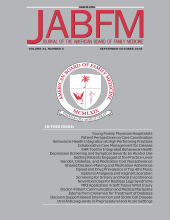Abstract
Background: Primary care physicians provide increasing care for elderly patients with chronic disabilities. To maintain these individuals in the community, families and other caregivers are supplying more intensive support in the home. Services, such as short-term respite care, can relieve the caregiver burden and allow the patient to continue community living. Whether hospital-based respite can be an effective option for patients is unclear.
Methods: To determine the patient outcomes in hospital-based respite, 15 elderly male respite patients (mean age 71 years) were matched and compared during a 6-month period with 14 elderly acute care control patients and 16 community-based elderly control patients who were chronically ill and were enrolled in a hospital-based home-care program.
Results: The average respite stay was 15 days. The respite group did not experience increased risk of mortality or iatrogenesis. Benefits at 6 months included fewer admissions for acute medical care for the respite group (P < 0.05). Total number of hospital days was equivalent for the respite group and community-based control patients and was fewer than that for the acute care group.
Conclusion: The results do not indicate any harm and argue that a slight benefit is associated with hospital-based respite for chronically ill older adults. Because of potential complications that can develop for chronically ill geriatric patients, a hospital setting for respite can be a viable respite alternative. A valid concern for physicians, however, remains the potential danger of a greater rate of iatrogenic illness and expectation of more aggressive care based on a tertiary care model.







